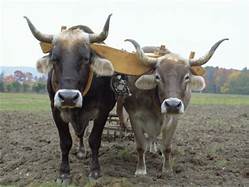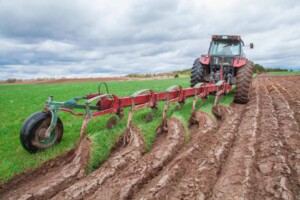The Stewardship of Your “Beast”
A righteous man regardeth the life of his beast: but the tender mercies of the wicked are cruel. He that tilleth his land shall be satisfied with bread... —Proverbs 12:10-11
Our text says a righteous man will regard the life of his beast. God cares about the welfare of His animal creation and we should also. The word “regardeth” means to know. He knows where the beast came from and what it’s needs are. If his beast needs rest, he will see that it gets rest (Ex. 20:10). If it is hungry, he will feed it (Dt. 25:4). He will treat his beast with “tender mercies” and not with cruelty (Dt. 22:6). That is why there are laws against cruelty to animals.
Barb and I recently took our Rat Terrier (“Charming”) for a walk. About a mile down the pathway I noticed Charming was limping and favoring one of his back paws. He was obviously hurting, so I reached down and carried him back home in my arms. All the way home I was thinking, “Charming, you are fortunate I regard the life of my ‘beast.’”
 In Matthew 15:22-28 we have the account of Gentile woman who came to Jesus pleading for Him to heal her daughter. Jesus answered her request saying, “It is not meet to take the children’s bread, and cast it to dogs.” In essence Jesus called her a “dog.” How did she reply to that? She said, “TRUTH, Lord: yet the dogs eat of the crumbs which fall from THEIR masters’ table.” You’ve got to admire her faith. She gave Jesus a reason He could not refuse. She did not deny she was a dog. She simply accepted her place as a “dog” under her Master’s table.
In Matthew 15:22-28 we have the account of Gentile woman who came to Jesus pleading for Him to heal her daughter. Jesus answered her request saying, “It is not meet to take the children’s bread, and cast it to dogs.” In essence Jesus called her a “dog.” How did she reply to that? She said, “TRUTH, Lord: yet the dogs eat of the crumbs which fall from THEIR masters’ table.” You’ve got to admire her faith. She gave Jesus a reason He could not refuse. She did not deny she was a dog. She simply accepted her place as a “dog” under her Master’s table.
Our text says, “A righteous man regardeth the life of HIS BEAST.” This Gentile woman applied this truth to persuade Jesus to grant her request. She was stating her case, “Yes Lord, I’m a dog, but I’m YOUR dog and You’re my Master. Being a righteous man You will take care of Your dog!” She had Him! She did what no one else could do during Christ’s 3½ years of earthly ministry—She entangled Him in His talk (cf. Mt. 22:15). How could Jesus refuse to grant her desire. If He refused, He would be admitting He was not righteous. So He said, “O woman, GREAT IS THY FAITH! Be it unto thee even as thou wilt.”
 Notice the context of Proverbs 12:10 is verse 11—“He that tilleth his land shall be satisfied with bread…” When a farmer tilled his land in Bible times he would use a yoke of oxen to pull his plow. Those oxen were his beasts. Oxen were not kept as pets. They were used to work, bear burdens, and pull plows to till land. Therefore a farmer would take great care for his ox (“beast”) so he could use it a long time to till his land. That is why Deuteronomy commands, “Thou shalt not muzzle the ox when he treadeth out the corn.” The owner of the ox would shelter it… feed it… watch over it… and allow it to get some rest.
Notice the context of Proverbs 12:10 is verse 11—“He that tilleth his land shall be satisfied with bread…” When a farmer tilled his land in Bible times he would use a yoke of oxen to pull his plow. Those oxen were his beasts. Oxen were not kept as pets. They were used to work, bear burdens, and pull plows to till land. Therefore a farmer would take great care for his ox (“beast”) so he could use it a long time to till his land. That is why Deuteronomy commands, “Thou shalt not muzzle the ox when he treadeth out the corn.” The owner of the ox would shelter it… feed it… watch over it… and allow it to get some rest.
Most farmers today do not use oxen to pull plows. Today farmers use powerful tractors. But the principle of Proverbs 12:10-11 still applies. A wise steward takes care of his equipment. He will keep it in top running condition. If a man neglects his equipment it will cease to be effective in their purpose.
Today farmers use powerful tractors. But the principle of Proverbs 12:10-11 still applies. A wise steward takes care of his equipment. He will keep it in top running condition. If a man neglects his equipment it will cease to be effective in their purpose.
Proverbs 12:10-11 teaches the importance of being a good steward of whatever God gives you to accomplish a purpose (i.e. a beast to till the land to make bread). Where did the farmer get the oxen to till his land? Where did he get the plow? Ultimately God gave them to him—therefore he should treat them as gifts from God (James 1:17). Even animals killed in hunting/fishing should be cooked and eaten (Prov. 12:27). Nothing should be wasted (cf. John 6:12).
We must recognize the fact that every good thing we have we got from God. Today our “beast” could be a car that transports us… a house to shelter us… or a lawn mower, a stove, a washing machine, a computer, etc. If you are a righteous steward you will regard whatever God has given you with care. You’ll want to get as much “life” [profitable use] out of it as you can. For example: Change the oil in your car… wash it… keep it tuned-up.
Do you regard the life of your “beasts?” Are you treating them as a gift from God?
